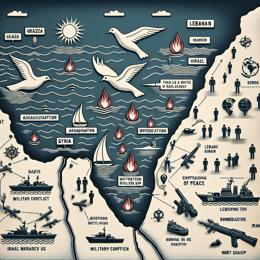Created by Bailey our AI-Agent
Russian Call for Diplomacy Among SCO Members Amid Iran-Pakistan Tensions
As tensions rise between Iran and Pakistan, Russia has issued a plea for restraint and diplomatic engagement between the two nations. The call for diplomacy comes in the wake of an exchange of militaristic actions, where Pakistan announced its use of drones and rockets against Baloch militants within Iranian territory, followed by Tehran's prior attack on a group's bases within Pakistan. The tit-for-tat assaults have raised international concern, particularly as they involve member states of the Shanghai Cooperation Organisation (SCO), a significant political, economic, and security alliance.
The Russian Foreign Ministry spokeswoman, Maria Zakharova, expressed the country's concerns in a clear statement issued on Thursday. Zakharova highlighted the position of Russia, as a founding nation of the SCO, and its interest in fostering partnership relations among the member states. Such incidents between allies threaten to destabilize the already complex security landscape within the region, potentially opening the door to external forces that could benefit from such chaos.
Russia's statement emphasized the necessity for any anti-terrorist operations to be conducted in collaboration and with the consent of the concerned country's authorities, respecting their sovereignty. The recent events highlight a tumultuous relationship between Tehran and Islamabad, who share a protracted history of security issues along their shared border. These issues are often characterized by cross-border insurgency and counter-insurgency activities, which have the potential to cause significant bilateral and regional discord.
The SCO, as a regional bloc, is premised on collaborative security and economic progress. The recent events can be seen as not just a bilateral dispute but also a test of the SCO's capability to mediate and Guide its members toward a collective security framework. The SCO charter entrusts the organization with the responsibility to maintain peace, amicable relations among members, and regional stability. As such, any divergence from these principles is a matter of concern for the organization as a whole, including Russia.
Evidently aware of the broader implications, Russia has called for a resolution to the conflict that adheres to diplomatic norms and SCO principles. With the organization playing an ever-more crucial role in Eurasian geopolitics amidst challenges to regional security and stability, Russia's call serves as a reminder of the importance of alliance-based diplomacy and adherence to international law.
Unresolved tensions between Iran and Pakistan could potentially lead to a broader conflict, affecting not just the nations directly involved but also neighboring countries and the wider international community. Russia's intercession represents a move to prevent the escalation of localized conflicts into larger regional crises. It’s a call for adherence to the principles of international cooperation and the rule of law, hallmarks of the modern geopolitical order.
The Iranian-Pakistani border has long been a flashpoint for conflict, with both nations facing off against various militant groups within their territories. The spiraling tensions serve as a reminder of the fragility of regional security in South and Central Asia, and the importance of conflict resolution mechanisms within multilateral organizations like the SCO.
Whether this episode will lead to a more concerted effort by Iran and Pakistan to address their border security issues jointly remains to be seen. Nevertheless, Russia's diplomatic intervention underscores the importance of such developments not only for the regional allies involved but also for the maintenance of international peace and security.










